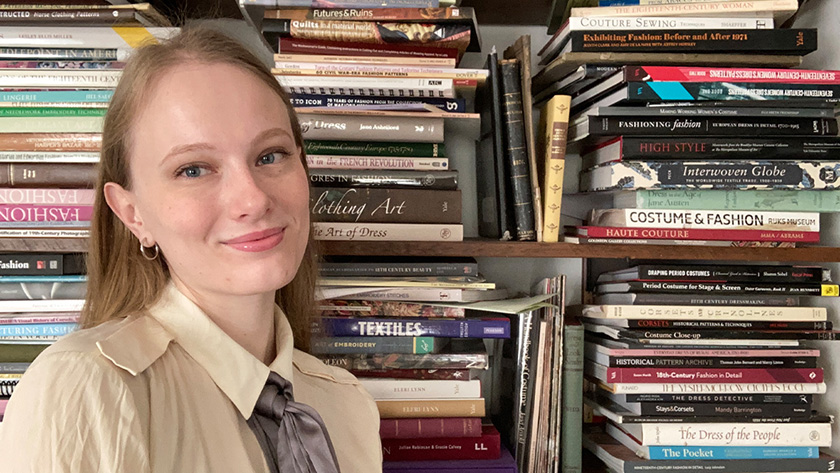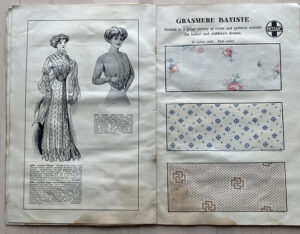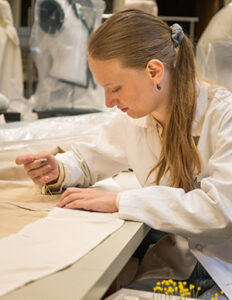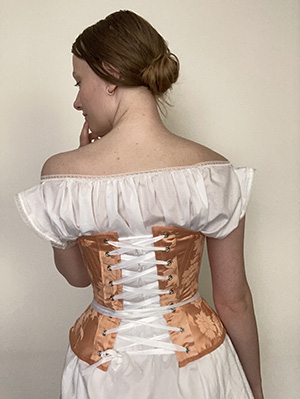
Margaret O’Neil, a graduate student in the Winterthur/University of Delaware Program in Art Conservation, collects books and archival materials on historical fashion, textile and fiber arts.
History Never Goes Out of Style: Understanding the Past through Fashion and Historical Dress
Article by Allison Ebner | Photos courtesy of Margaret O’Neil
This is the second in a series of articles highlighting the winners of the third annual Seth Trotter Book Collecting Contest, sponsored by the Friends of the University of Delaware Library.
When you have a question about historical fashion, your first stop should be Margaret O’Neil’s Textile Hotline.
Need insights on embroidery designs from the 19th century? Margaret, a graduate student in the Winterthur/University of Delaware Program in Art Conservation (WUDPAC), will point you to examples in a women’s magazine from 1839. Trying to identify if a particular article of clothing has Scandinavian roots? Margaret can share a book on 18th-century Scandinavian dress with you.
While there may not be an actual 800-number to reach this “hotline,” Margaret fields these types of questions from her fellow classmates and for her own projects with the help of her expansive book and archival collection on historical fashion, textile and fiber arts.

Margaret’s expansive collection includes an array of books, antique fashion catalogs and magazines, historical photographs, antique and vintage sewing patterns, and more.
Margaret’s collection includes nearly 200 books, antique sewing manuals, exhibition catalogs, textile conservation references and guides for historical sewing. Within her collection, you’ll also find antique fashion catalogs and magazines; historical photographs; antique and vintage sewing patterns; and loose fashion plates, pamphlets, advertisements and other ephemeral material.
“It is so satisfying to have a large book collection to pull from when I am researching a new project, like a set of 18th-century stays or a mid-1860s gown,” Margaret said. “The internet has great resources, but it is just not quite as quick and easy as looking through my bookshelf!”
When adding materials to her collection, Margaret often seeks out project-specific books, like the recent Balenciaga additions to her collection that will supplement her upcoming treatment of a 1939 Balenciaga evening gown. She also browses used bookstores, garage sales, estate sales and online platforms like Facebook Marketplace to discover well-priced treasures.

Given the antique nature of Margaret’s collection, the materials aren’t always in perfect condition. She uses her education and experience in conservation to ensure the fragile items that need additional support and protection are kept safe.
Given the antique nature of her collection, the materials aren’t always in perfect condition. Margaret uses her education and experience in conservation to ensure the fragile items that need additional support and protection are kept safe. She houses historical photographs in an acid-free photo box, fragile sewing patterns in polyethylene sleeves, and has even created custom structures, like acid-free phase boxes, to store items with elements that are torn or detached.
While her professional and academic experiences have helped her curate and care for her collection over the past four years, Margaret’s passion for historical fashion was born much earlier.
Growing up, she fell in love with historical dress thanks to historical fiction novels, BBC miniseries, and vintage clothing from her aunt. In high school, Margaret and her friends would dress up in period costumes they had sewn themselves for murder-mystery dinner parties.
“I remember my friend researching for her dress, and taking out a copy of Nancy Bradfield’s Costume in Detail, one of the seminal works of historical costuming,” Margaret explained. “[I was] awestruck at the level of detail in the construction of the gowns. I was hooked. I saved up some of my part-time job money and got a used library copy of [the book]. It was the first purchase for my collection.”
Since then, she has continued to use the books and archival materials in her collection to sew her own historical garment reproductions. Often using patterns for clothing and costumes in her size, Margaret incorporates as many historical techniques into these pieces as time allows.
“Being able to translate the information in these books into a tangible example of costume is always an exciting and rewarding process,” Margaret said.
Margaret made a 1790s gown by following the step-by-step directions within The American Duchess Guide to 18th Century Dressmaking. She created an 18th-century cape with guidance from Costume Close-Up: Clothing Construction and Pattern 1750-1790. When creating historical costumes, she references the historical photographs in her collection to have a better understanding of the clothing’s silhouette.

Margaret uses the books and archival materials in her collection to sew her own historical garment reproductions. Often using patterns for clothing and costumes in her size, she incorporates as many historical techniques into these pieces as time allows.
“Clothing is such a personal way of understanding history,” Margaret explained. “I mean, it’s literally the shape of someone’s body in their clothing. [It lets people] really click with history in such a tangible way.”
For Margaret, the most rewarding part of collecting books and archival materials is this ability to connect people with history, and to bring new life to old materials.
At every turn, she looks to make historical dress more approachable for everyone from the hobbyist to the historical reenactor to the fellow graduate student. In addition to her collection of books and archival materials, she shares her insights with the growing, dynamic historical dress community through her Costume and Conservation YouTube channel and website.
“My long-term goal is to really connect the public to textile conservation and, specifically, costume conservation,” Margaret said. “I want to connect them to these antique clothes and shine a light on textile conservation as a field—get people excited about it, get the public to know who we are.”
Seth Trotter Book Collecting Contest
Margaret O’Neil is one of three winners of the Friends of the University of Delaware Library’s 2021 Seth Trotter Book Collecting Contest. The other winners are Katrina Anderson and Logan Gerber-Chavez. The Friends created the contest to encourage reading and research, the creation of personal libraries, and an appreciation of printed or illustrated works for pleasure and scholarship among UD undergraduate and graduate students. If you’d like to support the Friends and the future of this contest, you can do so here.
